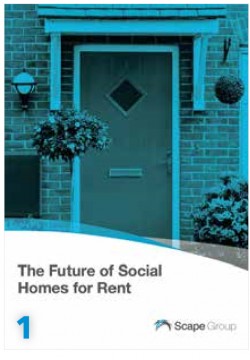The demand for social housing stock is sky high and the pressures to provide quality homes quickly and sustainably is a pivotal priority for local authorities across the UK. A 'radical solution' proposed by the Scape Group includes the accelerated use of offsite manufacture.
As has been repeated at length by all construction media and commentators over the last two to three years, to come anywhere near meeting the UK's housing demand, we need a massive change in the approach to housebuilding and a more innovative model to deliver high-quality new homes across all types and tenures.
The Future of Social Homes for Rent report saw Scape poll 50 senior managers and decision-makers within local authorities in England alongside 1,000 members of the public - the results were predictably damning - councils throughout England commented that they had an average of only 56 homes available and 64% of the public said they thought that we had reached a crisis point in the provision of homes available for social rent in England.
There are approximately 1,700 housing associations in England. In 2017/18, registered providers based in England, representing 89% of the UK housing association stock completed just 4,500 homes for social rent.
"This is not simply the result of short-term factors like Brexit, the Rent Reduction Policy, or Right to Buy, says Mark Robinson, Chief Executive, Scape Group. "This is a long-term problem with the rate of construction that needs to be addressed. Councils must be empowered to build social housing themselves - as they were in the 1970s before housing associations started to occupy a key role as nongovernmental delivery agents for the provision of social rented housing. In 1977, when new social housing remained the responsibility of councils 121,000 homes were built."
The report states a clear case for change and as a society, we face a huge turning point in the delivery of new affordable housing. "Finance has always acted as a key barrier to local councils' ability to make a difference to housing output. With the correct resources and powers, they can serve as engines for housebuilding in communities across the whole of the UK. On the other hand, this will create tens of thousands of new homes, whereas the UK needs hundreds of thousands, and this is unlikely to be channelled towards sufficient homes for social rent."

The Ministry of Housing, Communities & Local Government has said that Government will be "breathing down the necks" of local authorities who fail to meet their housing targets under the revised National Planning Policy Framework (NPPF). The Government is now enforcing new rules which will remove the right for councils to decide what is built in their area if they are unable to meet their targets. Instead, an appointed inspector will make the decision on their behalf to ensure housing is being delivered on time.
"Rather unfairly, local authorities are being positioned as the scapegoat. It is clear that councils want to do more to ease the housing crisis. Three in every five (60%) of councillors with lead responsibility for housing in their local authority said that social housing is their main investment priority."
The solution is to look for options that can deliver quality new homes more efficiently and cost-effectively, providing the dual benefit of delivering much needed social rent housing and the funding-stream for providing the value-added services.
Offsite and factory-controlled delivery aims to improve overall business efficiency, reduce client intervention and deliver a quality product, reduce snagging, whilst providing long-term environmental performance and hugely condensed delivery timescales.
MMC can also help to minimise waste, which is an important environmental consideration for councils. When we asked housing leaders how important their local authority considered minimising construction waste in achieving quality and lower cost affordable homes, 22% said 'extremely important' with 57% saying the same in London and the south-east.
Fortunately, councils are open to the possibilities presented by offsite. When asked if local authorities would consider offsite as an option for housing delivery in their area: "100% of council representatives informed us that they would, 97% of councils reported that they thought a pre-designed system with offsite construction would support their delivery certainty.
And 35% of local authorities said they would consider stipulating the use of increasing levels of offsite fabrication or a modular approach to housing units - if only to increase the certainty of delivery of their required housing supply. While the report proposes a 'radical solution to the social housing building problem', delivering the number of homes we need to build to make up for years of underinvestment, requires a revolution in the delivery of social housing. Registered providers and local authorities, looking to accelerate their building programmes - for social rent or otherwise - should consider the benefits of offsite.
"The Government must consider ways of using the planning system to make it easier to build modular developments. For example, pre-approved modular designs could be 'fast-tracked' through the planning system. And while there are now plenty of providers, none are currently delivering at the scale needed to bring costs down below those of traditional methods. High-quality providers, capable of delivering at scale, should be supported by Government, with a strategy to ensure collaboration and encourage consolidation."
For more information and to download a copy of the report: www.scapegroup.co.uk/research









